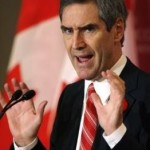Ignatieff's Soft Attack on Anti-Semitism
 You'd think it would be impossible for a politician to mess up a speech on anti-Semitism. Message: I'm against it. What could be simpler?
You'd think it would be impossible for a politician to mess up a speech on anti-Semitism. Message: I'm against it. What could be simpler?
You'd think it would be impossible for a politician to mess up a speech on anti-Semitism.
Message: I'm against it. What could be simpler?
For Michael Ignatieff, the task may have been just too simple. I arrived in Ottawa Monday just in time to hear the Liberal leader speak to delegates to an inter-parliamentary conference on combating anti-Semitism. Attendees were still buzzing over a powerful speech earlier in the morning by Prime Minister Stephen Harper. Harper had served strong coffee. Ignatieff now served weak tea.
Ignatieff wanted the audience to know that he repudiated and condemned anti-Semitism and intolerance. But he also wanted them to know that it was important to preserve the right to criticize Israel. Ignatieff conceded that anti-Israel criticism might get out of hand, at the UN for example. But he expressed this concern primarily in terms of the harm this one-sidedness did to "the UN system," rather than to the unfairness to Israel.
The most disturbing thing the Liberal leader had to say was this: He suggested that global anti-Semitism would be reduced by a settlement of the Arab-Israeli dispute.
As a matter of analysis, this statement is at best arguable: You could equally say that but for the horrible Jew hatred that has been fomented in the Islamic world this past half century, the Arab-Israeli dispute would have been settled long ago.
But think about Ignatieff's words as a matter of moral principle. If Ignatieff were attending a conference on violence against women, would he dare suggest that there might be less such violence if women nagged their husbands less? Of course not. That would be outrageous. Yet that is what he had to say here.
Forced even-handedness suffused the speech.
Ignatieff talked movingly of visiting the firebombed Talmud Torah dayschool in Montreal in 2006. Fine. Good. He then immediately mentioned that he had also visited a mosque that had its windows broken. Also fine, we can all agree it's wrong to vandalize mosques too. OK. But why mention the one immediately after the other? What relationship did these two events have to each other?
Would Ignatieff follow a description of an attack on a synagogue with a condemnation of crime by motorcycle gangs? A lament for bullied gay teens? That would be a clanging non-sequitur, another topic for another comment. Yet in the mind of Ignatieff's team, anti-Semitism apparently cannot be condemned without immediately and equally condemning anti-Muslim prejudice. That's an interesting reflex, isn't it? It suggests that someone is afraid of overdoing the anti-Semitism thing, somebody wants to balance condemnations of anti-Semitism lest anti-Semitism get more than its fair share of attention.
I may be very wrong about this, but to the ears of a former speechwriter, Ignatieff's speech sounded very like it had been worked on by at least two authors. One author wished to sound a strong message of support to the Jewish community. The other author wanted to pull back.
Ignatieff reiterated his condemnations of the "Israel Apartheid Week" held on some university campuses as an attempt to "delegitimize a democracy." Those are welcome words. But along the way, he had this to say: "Israel is Israel. Apartheid South Africa was a crime against humanity."
Say that aloud. Weird, right? It's Rhetoric 101: parallel sentences share a parallel construction. It makes you think that the first sentence originated as "Israel is the Middle East's only democracy." Or: "Israel is the historical homeland of the Jewish people." Then somebody decided such a statement was too controversial, and so emended it to the baldly undeniable statement "Israel is Israel." That's certainly accurate -- but it's something less than a ringing endorsement.
If I were a Liberal, I'd have come out of that room wondering: What on earth happened to the leader's staff? When a party leader speaks, his people should think: Why is he saying this? Why here? Why now? The leader may believe that wine-making is indispensable to the local economy. But a convention of Mothers Against Drunk Driving is not the ideal forum for this thought. Michael Ignatieff may believe that we are equally in danger of having too little criticism of Israel as too much. Somebody near him ought to have proposed that he find a different venue for this particular apercu.
Originally published in the National Post.